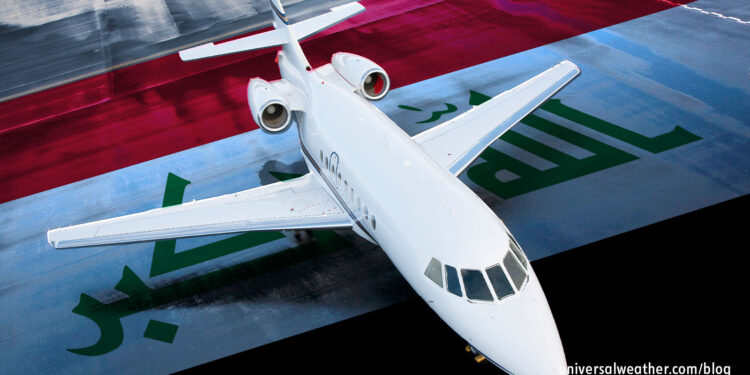Business Aviation Operations to Iraq – U.S. Sanctioned Country Series

While the broad economic sanctions on Iraq were lifted by the U.S. and most countries in late 2010, the U.S. Government still imposes significant restrictions on U.S.-registered aircraft that still impact business and general aviation aircraft operations involving Iraq. As a result, it is important for U.S. business aviation operators to be aware of these restrictions and to work with an experienced 3rd-party service provider that can help the company minimize possible delays, disruptions, and penalties for non-compliance.
1. Current restrictions when traveling to or from Iraq
The comprehensive economic sanctions on Iraq were removed by the U.S. Government in September 2010. As a result, business aircraft operators no longer have to obtain a specific license from the Treasury Department’s Office of Foreign Asset Control (OFAC) or a temporary sojourn license issued by the Bureau of Industry and Security (BIS) prior to operating an N-registered aircraft to or from Iraq. However, Iraq remains subject to the dual-use export controls administered by BIS, and operators need to ensure that all passengers and crew are aware of these restrictions, which include export license requirements for the export and re-export of certain items controlled by the U.S. for national security and other reasons. In addition, it is also necessary to screen business partners in Iraq against OFAC’s Specially Designated Nationals List, since there are still specific persons, entities, and businesses in Iraq that remain prohibited by OFAC. Your 3rd-party provider may be able to perform this screening as an additional service.
Unlike the U.S. sanctions on Cuba, however, the U.S. never imposed restrictions on U.S. persons traveling to or from Iraq. Nevertheless, one of the key restrictions on aviation operations imposed by the U.S. during the Iraq War, the Federal Aviation Administration’s Special Federal Aviation Regulation 77 (“SFAR 77”), still remains in place to this day. As a result, all U.S. operators must be mindful of the scope and impact of SFAR 77.
2. Understanding SFAR 77 prohibitions and exemptions
Because of concerns over the safety of any U.S. operators and civil aircraft in Iraq, the FAA’s SFAR 77 places a number of restrictions on flight operations involving Iraq. In general, SFAR 77 prohibits all flight operations within the territory of Iraq, unless subject to the one of the limited exemptions described below.
The prohibitions in SFAR 77 apply to: (a) all U.S. air carriers or commercial operators, (b) all operators of N-registered aircraft (except where the operator of such aircraft is a foreign air carrier), and (c) persons exercising the privileges of an airman certificate issued by the FAA (except persons operating U.S.-registered aircraft for a foreign air carrier).
Although flight operations by the above persons and aircraft within Iraqi airspace are prohibited, SFAR 77 authorizes overflights of Iraq as long as they are conducted above flight level (FL) 200 and subject to the approval of Iraq’s Civil Aviation Authority. In addition, flights departing from countries adjacent to Iraq whose climb performance will not permit operation above FL 200 prior to entering Iraqi airspace may operate at altitudes below FL 200 within Iraq to the extent necessary to permit a climb above FL 200. Many 3rd-party providers have experience in obtaining overflight permits involving Iraqi airspace.
The only exceptions to SFAR 77 are when such operations are authorized by an exemption issued by the FAA Administrator, by another agency of the U.S. Government with the FAA’s approval, or in certain emergency situations. While SFAR 77 exemptions are rarely granted, a U.S.-based 3rd-party provider can assist the operator after the exemption or other approval is issued by the U.S Government. Operators should plan on sufficient lead time for obtaining such an exemption, and each exemption has a different validity period depending upon the specific operation. Some exemptions allow multiple Iraq entries. Once an operator has an Iraq exemption or approval, a 3rd-party provider can coordinate all typical trip support services, including:
- Prepare and file flight plans and provide weather information
- Arrange and pay for all required flight permits
- Organize all trip related transactions, including ground handling, aircraft parking, hotels, landing fees, APIS filings, and aviation fuel
- Provide credit and payments for all government and private services required in Iraq
With respect to other issues, when overflying Iraq or operating within Iraqi airspace, it is important to check your lease agreement, insurance, and your company’s operational specifications for any other restrictions that may bar you from overflying Iraq. Also, keep in mind that your organization’s security department may have restrictions or guidelines in place regarding risk and risk mitigation, limiting your ability to operate to or overfly Iraq.
3. Non-U.S. registered aircraft may use the services of a U.S.-based 3rd-party provider without any specific permit or exemption
U.S.-based 3rd-party providers can provide the same trip support services for non-U.S. registered aircraft as they do for U.S.-registered aircraft with SFAR 77 exemptions. As noted above, SFAR 77 does not apply to non-U.S. registered aircraft. While U.S.-based 3rd-party providers cannot deal with any person or entity in Iraq that is on a restricted party list, such restrictions are targeted towards specific entities and individuals that have been sanctioned for illegal acts such as export violations, international acts of terrorism, narcotics and weapons trafficking or money laundering.
4. Benefits of a 3rd-party provider
While it is possible for operators to set up all Iraq arrangements on their own, the process can be difficult and payment options troublesome. 3rd-party providers have credit available for all required services, and this is preferred to carrying cash or attempting to settle for services on your own by way of assorted credit means. It can also be difficult sourcing and setting up local service providers in Iraq without the assistance of an experienced 3rd-party provider.
Conclusion
Significant restrictions remain on the operation of business and general aviation aircraft to or from Iraq. While operators of U.S.-registered aircraft can only conduct operations to or from Iraq after receiving U.S. Government approval, even in such cases the trip planning process is no longer difficult or onerous. While additional lead time is necessary for such trips, it is a good idea for business aircraft operators to work with experienced 3rd-party providers who can assist in navigating the complex issues associated with these trips.
Questions?
If you have any questions about this article, contact Christine Vamvakas at christinevamvakas@univ-wea.com.




